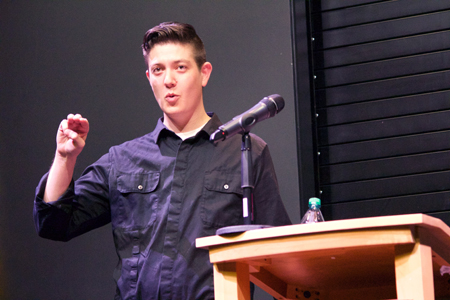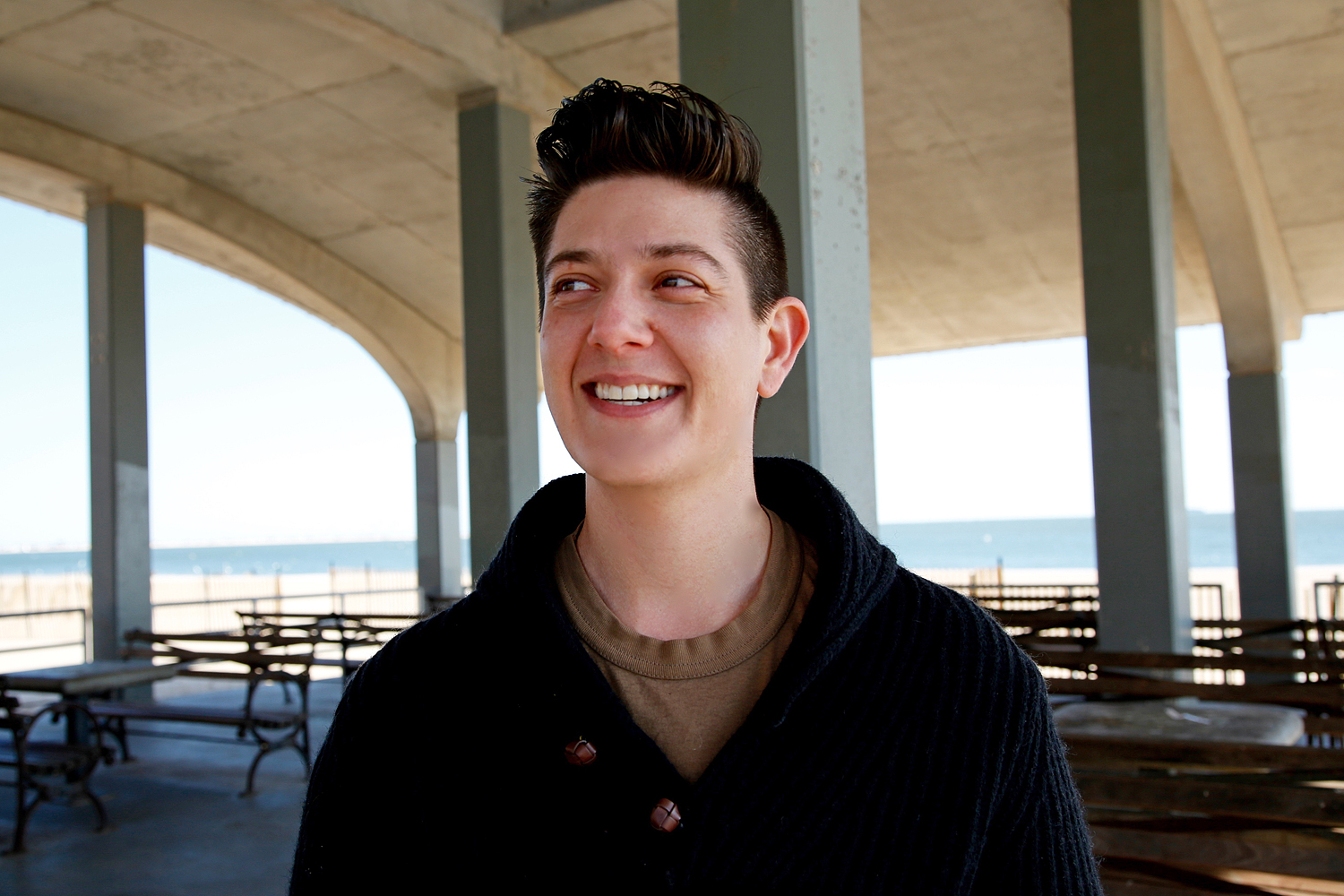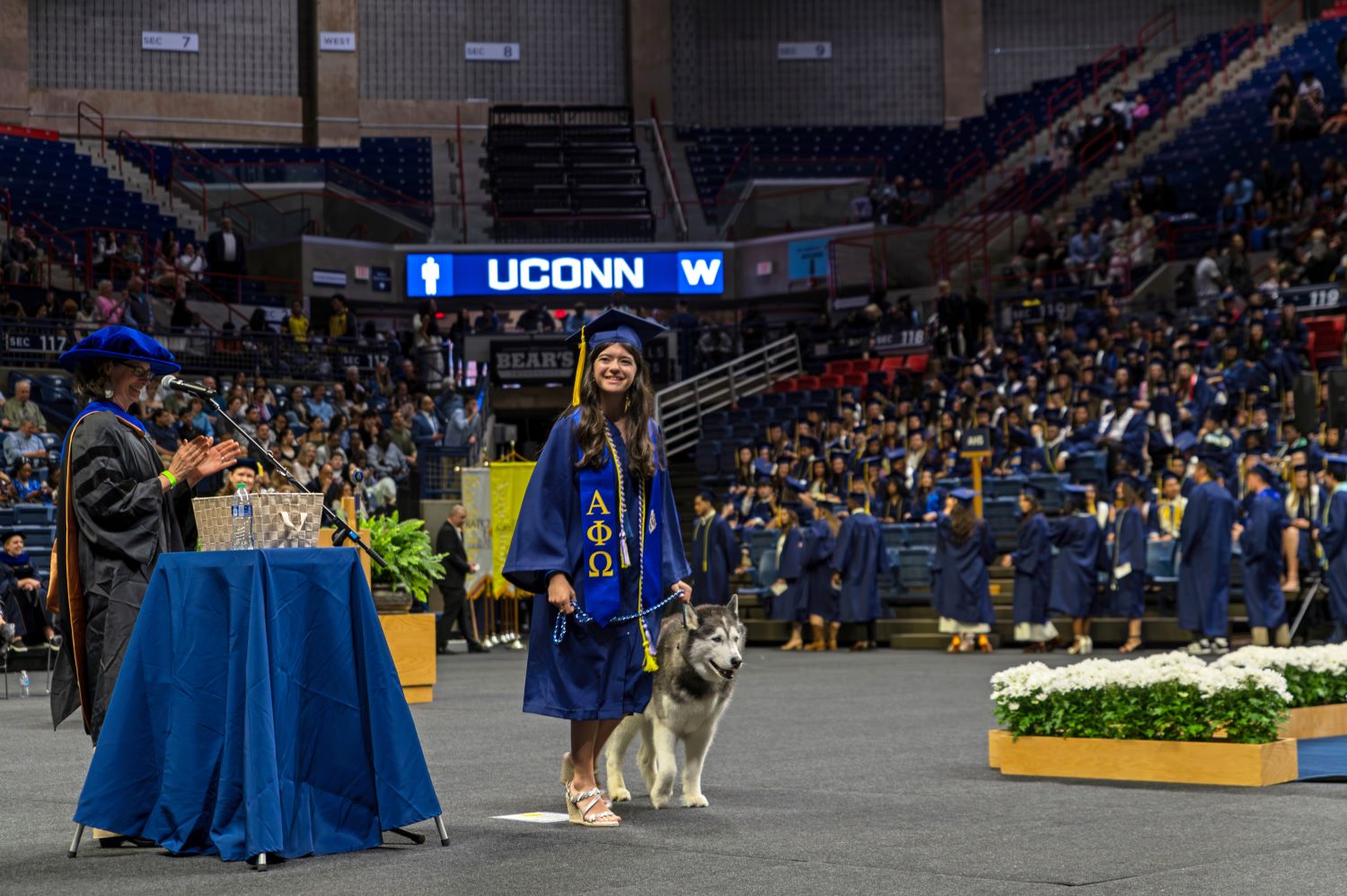The room becomes completely silent as Miller Oberman raises his hands like parentheses, pausing dramatically, staring into a crowd of fellow poets, students, and faculty members at the UConn Co-Op in Storrs Center. Over the hush, he reads “The Ruin,” his words punctuated by pauses that, although seemingly haphazard, keep time with the rhythm of the Old English poem.
“Yet even now the [ ] heaped over with [ ] / remains [ ] / savagely scraped [ ] / grimly ground up [ ] / [ ] shone [ ] / [ ] skillful working ancient building,” Oberman reads.
The scattered silences echo the words missing from the poem’s only copy, in a book more than 1,000 years old that’s pocked with missing pieces showing the wear of its age. The English Ph.D. student sees beauty in these silences, and as he speaks, he works to keep them alive.
A group of poems from Oberman’s dissertation, which includes translations of Old English poems and his own original work, this year has earned him a 2016 Discovery Prize, given by the Boston Review and the 92nd Street Y. The prize is renowned for launching the careers of major modern poets, and honors Oberman for the poems in his dissertation, also titled “The Ruin,” that connects ancient poems to the modern poetry world.
“It’s a way of respecting Old English poems,” Oberman says of his approach. “Let’s hold this empty space here in the poem where there used to be a thing.”
From a very young age, Oberman was immersed in words. He used to go to his local library and check out every book he could carry. He often chose the biggest books he could find, even though he did not always fully understand them.

“I don’t remember not being able to read!” he says. “I read Moby Dick when I was in second grade … well, I read the words at least. I remember just wanting to read impressive things. I wanted to casually hang out downtown, reading War and Peace or something, possibly in Russian.”
This love of language quickly developed into a love of poetry. Oberman studied poetry throughout high school and college, before entering the Ph.D. program in English at UConn.
“When I came [to UConn] to get a Ph.D., I realized that I didn’t really know anything about my own language,” says Oberman. “I decided I was going to try to learn Old English.”
Old English is the earliest recorded stage of the English language, which was used for more than 700 years from the 5th century to the late 11th century. Famous works that were originally in Old English include Beowulf and Caedmon’s Hymn.
At UConn, Oberman says he became “obsessed” with the language and its rich history. He found that most of the poems in the language were translated by poets who did not know the language well, or by Medievalists who were not familiar with writing poetry. Oberman thought he could fix this disconnect as both a poetry and medieval studies scholar.
Translating a poem can be a very complicated and creative process. It’s not just about creating a direct word-for-word account, but also about re-writing in a way that makes sense musically, says Oberman. His notebook, color-coded and with tiny notes in the margins, contains notes he’s taken in his classes, lists, and translation pages.
Oberman takes the original text and writes the word-for-word translation beneath it. Often there is not a direct translation for certain words or phrases in Old English, so the creative part, he says, is deciding what words embody the original meaning best.
Frequently, the poems are missing words or are incomplete. Where the original text is missing, he inserts a set of brackets. Since Old English poems follow strict rules for meter and structure, he is able to determine almost exactly how much of the poem is missing.
In “The Ruin,” the speaker comes across a destroyed and abandoned city, which Oberman explains is the ruins of a city built by Romans, and describes the experience.
“The speaker is looking at the city in ruins, but the city is more advanced than anything the speaker has ever seen before,” he says. “For us to find the ruins of a city more advanced than us, that’s science fiction! Like, if these people were so advanced, how could this have happened?”
The title poem of his dissertation originally comes from an ancient, one-of-a-kind book called the Exeter Book, which contains many Old English poems that we know of today. Someone put a hot poker on the book nearly 1,000 years ago, burning holes through the pages, ruining parts of many poems.
Oberman says that there have been many translations of “The Ruin,” but they almost always try to smooth out the missing sections.
“In a poem about ruins, the whole thing is about gaps and fallen, missing things, and now you’re working with a document that has gaps and fallen, missing things in it, and then you’re just faking that? Why would you fight that?” he asks.
Oberman thinks contemporary poets understand that space in a poem is important to its meaning and sonic quality.
“There’s stuff outside of the frame, and sometimes the frame has nothing in it,” he says. “I think [modern poets] really understand that.”
Winning the Discovery Prize is a humbling experience, he says, but he hopes it will give a major leg up to his book project.
“In the world of poetry there isn’t much money, but some things have a lot of prestige,” he says. “So if you’re a poet, then you know that getting this is very cool.”
Back on stage, Oberman closes “The Ruin” with a description of the waters of Rome, using his hands to depict the natural breaks. The broken meter seems to augment the sense of true majesty lost.
“Then they let flow [ ] / hot streams over old stone / [ ] / [ ] until the ringed pool hotly [ ] / [ ] where they were. / When is [ ] / [ ] That is a kingly thing / house [ ] / [ ] city [ ].”



